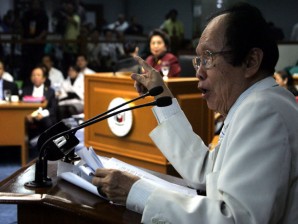Cuevas may appeal to SC in case of Corona conviction
MANILA, Philippines — On the eve of judgment day, lead defense counsel Serafin Cuevas set the stage for a possible appeal in the Supreme Court once Chief Justice Renato Corona is convicted by the Senate impeachment court.
It took Senate President Juan Ponce Enrile, the presiding officer at the impeachment, to elicit this information from Cuevas, who had earlier revealed this legal strategy in a radio interview with dzBB.
As soon as the impeachment tribunal convened on Monday, Enrile quickly clarified this with Cuevas.
“I understand that there was an interview done where you are involved this (Monday) morning, and that you indicated that your resolve to elevate the results of these proceedings to the Supreme Court, is this correct?” asked Enrile, to which Cuevas denied, saying:
“I did not have any interview with anybody this morning. In fact, I woke up about 9 a.m. already because of the preparation of my (closing) argument.”
Enrile then produced a transcript of the interview, prompting Cuevas to clarify that the interview actually took place Sunday.
Reading from the transcript, Enrile quoted Cuevas as saying this:
“We have no other alternative but to resort to (a petition for) certiorari. I’ll ask for a petition for review questioning the validity of the actuations of the proceedings with the impeachment court and necessarily with a motion to nullify the entirety of the proceedings that took place therein.”
Cueva asserted the defense’ right to run to the high court over questions related to the impeachment court, insisting that the Constitution did not specifically bar Corona’s lawyers from doing so.
“That’s not written in the Constitution. What was written (in the Constitution is) the moment the Senate convenes as the impeachment court, (it) shall continue the trial. There is nothing there that says that the decision shall be final and non-appealable,” said Cuevas in the radio interview.
Enrile, however, disagreed with this interpretation of Section 17 of Article 11 of the 1987 Constitution (Accountability of Public Officers).
Article 11 spells out the nitty-gritty of the impeachment process, with the power to initiate an impeachment complaint vested in the House of Representatives (Section 3), and the Senate “shall have the sole power to try and decide all cases of impeachment” (Section 6).
The whole articles rests on the principle of “public office is a public trust” (Section 1).
Enrile echoed Article 11, saying:
“We respect your position, but I just want to remind you that our reading of Article 11 provided that the Senate shall have the sole power to try and decide all impeachment cases.”
Enrile, however, did not see it fit to debate with Cuevas on the matter.
“I just want to put that into the record,” said the presiding officer.
Cuevas then eventually admitted that he indeed made those pronouncements.
“Yes … if the question refers to the interview with (Rowena) ‘Weng’ Salvacion, I admit that last Sunday, I think in her program, I was interviewed, and I made those statements,” said Cuevas, a former associate justice of the Supreme Court.
“All right,” said Enrile.
At this point, Senator-judge Miriam Defensor-Santiago raised a point of order on the form of punishment to be imposed on the Chief Justice should a conviction is handed down by the tribunal today (Tuesday).
“(Section 7, Article 11 of the) Constitution provides, and I quote, ‘judgment in cases of impeachment shall not extend further than … removal from office and disqualification to hold any office under the Republic of the Philippines,’” said Santiago.
She, however, did not mention the second part of Section 7, which adds that “… the party convicted shall nevertheless be liable and subject to prosecution, trial, and punishment, according to law.”
In her own interpretation, Santiago said that Section 7 would allow a lesser penalty for an impeached official, although this was not explicitly mentioned in the aforementioned section.
Thus, the Senate can impose a lesser penalty like censure, reprimand, fines, suspension from office, or the like,” claimed Santiago.
Posing a question to her colleagues, senator asked: “In case of conviction, how can penalty be determined? I humbly present this question both to the presiding officer and to our colleagues, not necessarily to be answered immediately but to be disposed off at the discretion of this court.”
Aware that Monday’s hearing was allotted for the closing arguments of both sides, Senate Majority Leader Vicente Sotto III sought the indulgence of Santiago.
“Perhaps, we can take it up after today’s session,” said Sotto.















